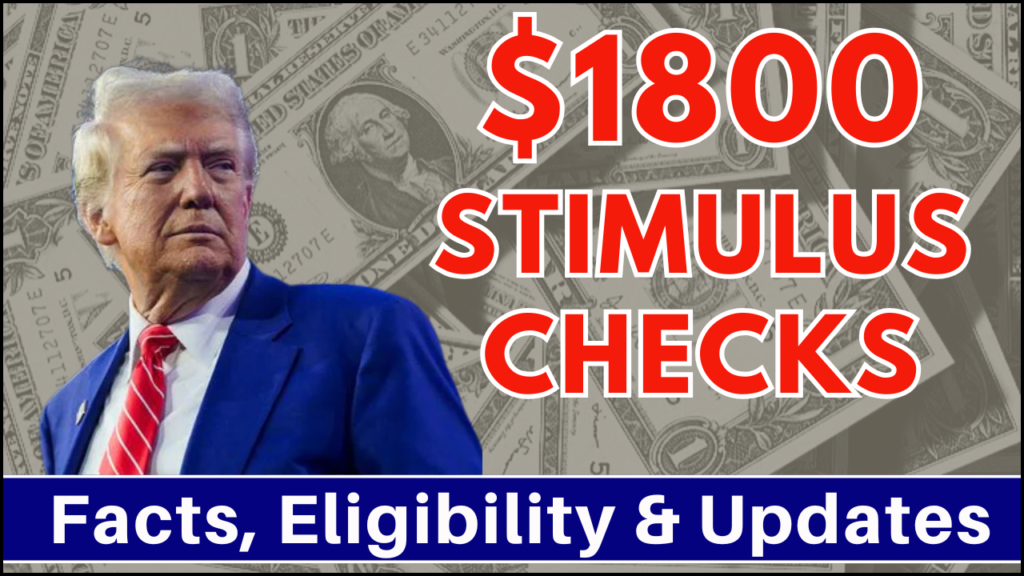
The ongoing economic concerns and rumors about financial aid from the government have stirred considerable interest among Americans. The supposed $1800 stimulus checks distribution in January 2025 has generated a buzz, with many seeking clarity on the subject. Here’s an issue analysis, exploring its facets from eligibility criteria, official confirmations, rumors, and the implications on citizens.
Understanding Stimulus Payments
Stimulus payments are financial aid governments give to alleviate economic stress during significant crises. The U.S. government provided stimulus checks during the COVID-19 pandemic in three rounds between 2020 and 2021. These payments were meant to support individuals and families facing financial distress due to job losses or increased expenses.
With inflationary pressures still being felt across the U.S., discussions about renewed stimulus checks often surface. However, it’s essential to rely on official sources rather than unverified social media claims.
$1,800 Stimulus Checks for January 2025
| Department | IRS (Internal Revenue Service) |
| Program | January Stimulus Checks |
| Country | USA |
| Amount | $1800 |
| Payment Status | No confirmed date for January 2025 |
| Real or Not? | Details Given Below |
| Category | Government Aid |
| Official Website | www.irs.gov |
Truth Behind the $1800 Stimulus Checks in 2025
Lack of Official Confirmation
Despite online rumors, no official statement from the IRS or federal government corroborates the claim of $1800 stimulus checks being distributed in January 2025. Authorities have not announced any new stimulus programs since the last rounds of payments ended in 2021. Citizens are urged to consult credible sources such as the IRS’s website for updates.
Economic Context
Stimulus checks are typically issued during major economic downturns. While inflation continues to affect household budgets, the U.S. economy has not faced a crisis severe enough in recent years to necessitate direct payments akin to those distributed during the pandemic.
Eligibility Speculations
For citizens looking to understand potential eligibility criteria based on past payments, the following conditions would likely apply:
- Economic Hardship: Individuals severely affected by unemployment, inflation, or other economic challenges may qualify if a program is launched.
- Income Limits: Past stimulus checks set thresholds at $80,000 for single filers and $160,000 for joint filers, ensuring aid reached low and middle-income groups.
- Citizenship and Residency: Eligibility requires permanent U.S. residency or citizenship.
However, since no official policy exists for 2025 checks, the above criteria remain hypothetical.
Common Myths and Misinterpretations
Rumors surrounding financial relief often stem from misunderstandings or manipulations of past programs. Below are common misconceptions:
1. Everyone Qualifies for Stimulus Payments
Stimulus payments aim to target specific groups, such as low-income families, retirees, or disabled individuals. Universal eligibility is rare and depends on a program’s specific terms.
2. Fixed Payment Dates
Several articles misleadingly claim a confirmed payment schedule for January 2025, though no federal announcements have been made. It’s vital to track updates through credible sources rather than relying on social media.
3. Government’s Unlimited Financial Ability
While stimulus payments offer immediate relief, they require substantial federal funding, which impacts the economy. Decisions to issue such aid depend on fiscal priorities, inflation management, and public debt considerations.
Financial Aid in Recent History
| Type | Recipients | Amount | Dates Distributed | Purpose |
|---|---|---|---|---|
| COVID-19 Stimulus 1 | All eligible Americans | $1,200 | April 2020 | Pandemic relief |
| COVID-19 Stimulus 2 | All eligible Americans | $600 | December 2020 | Pandemic relief |
| COVID-19 Stimulus 3 | All eligible Americans | $1,400 | March 2021 | Pandemic relief |
Balancing Public Needs and Government Capacity
Governments weigh public needs against financial sustainability when planning stimulus programs. With the U.S. economy showing signs of recovery after pandemic-induced slowdowns, the necessity and feasibility of new stimulus checks are under question. While rising costs remain an issue, other policy tools, such as tax rebates or inflation-fighting measures, may be used instead.
Importance of Verifiable Information
1. Avoiding Scams
Fraudulent claims about stimulus checks often seek to extract personal or financial data. Citizens must avoid falling prey to such scams and verify all information from official channels.
2. Reliable Sources
Official resources such as the IRS website or announcements from federal departments are the most dependable means to gather accurate updates.
3. Understanding Current Policies
Awareness of ongoing programs and financial aid options—such as Social Security benefits, tax refunds, or other federal programs—ensures citizens do not rely on unconfirmed stimulus rumors.
Recommendations for Citizens
To navigate economic challenges effectively, citizens can adopt the following practices:
- Monitor Authentic News: Stay updated with IRS or SSA statements for official announcements.
- Review Current Benefits: Examine eligibility for existing aid programs like tax rebates or Social Security.
- Plan Financially: Budgeting for essential expenses and building an emergency fund helps manage economic uncertainties.
Frequently Asked Questions
1. Are the $1800 stimulus checks for January 2025 real?
No official confirmation exists for $1800 stimulus checks in January 2025. Rely only on updates from trusted sources like the IRS.
2. How can I verify eligibility for government aid programs?
Visit the IRS or SSA websites to understand eligibility criteria for existing federal aid programs, such as tax refunds or Social Security.
3. What are alternative ways to address rising expenses?
Consider government programs like tax credits, budgeting for essential needs, and exploring local community assistance to combat financial challenges.
Conclusion
The claims about $1800 stimulus checks being distributed in January 2025 are unsubstantiated. While government support programs provide vital financial relief during crises, the present scenario lacks sufficient grounds for such payments. Citizens must rely on verified information to avoid confusion and focus on alternative solutions to manage their economic well-being. By staying informed, Americans can safeguard themselves from rumors and prepare for genuine opportunities.